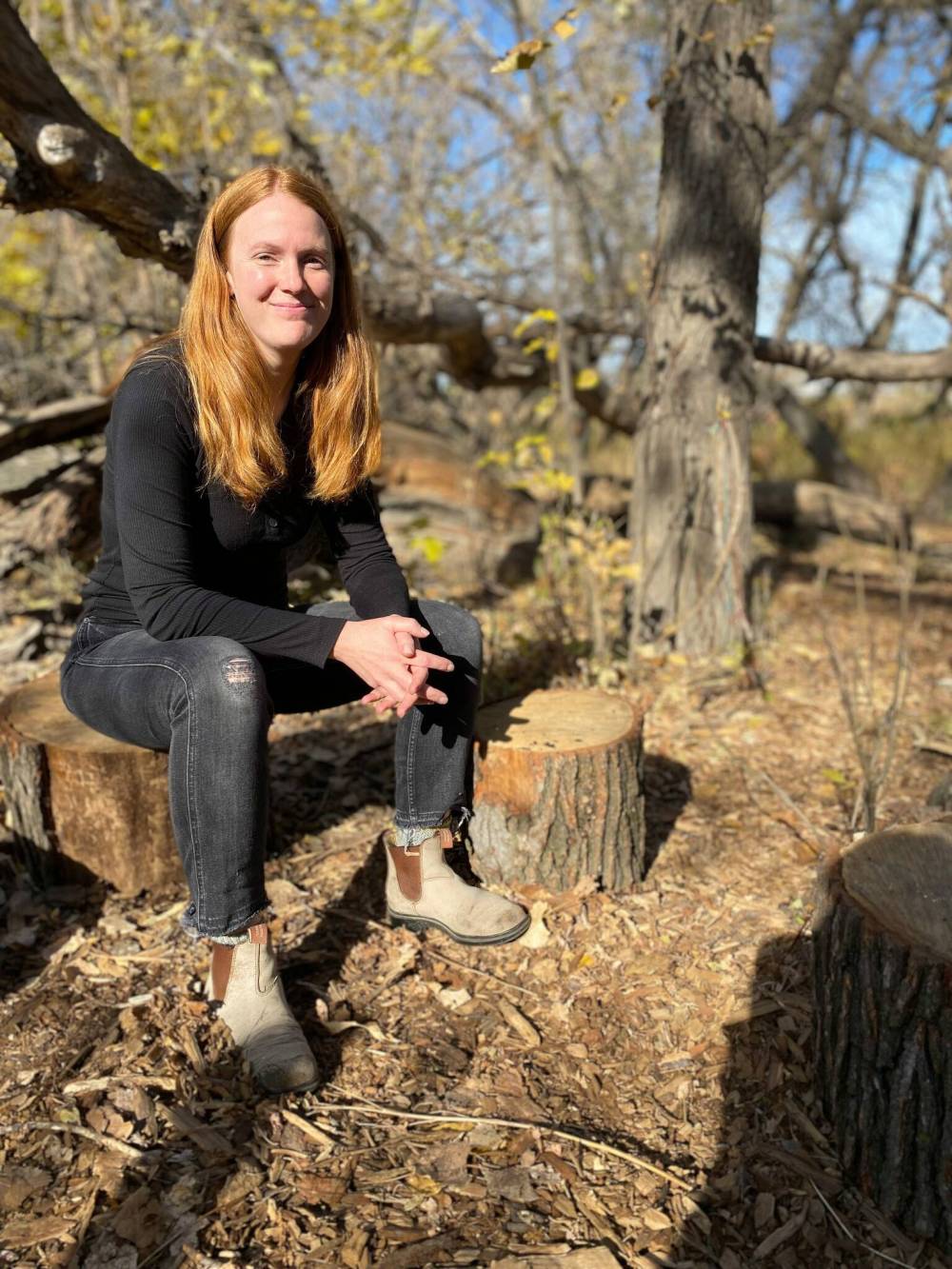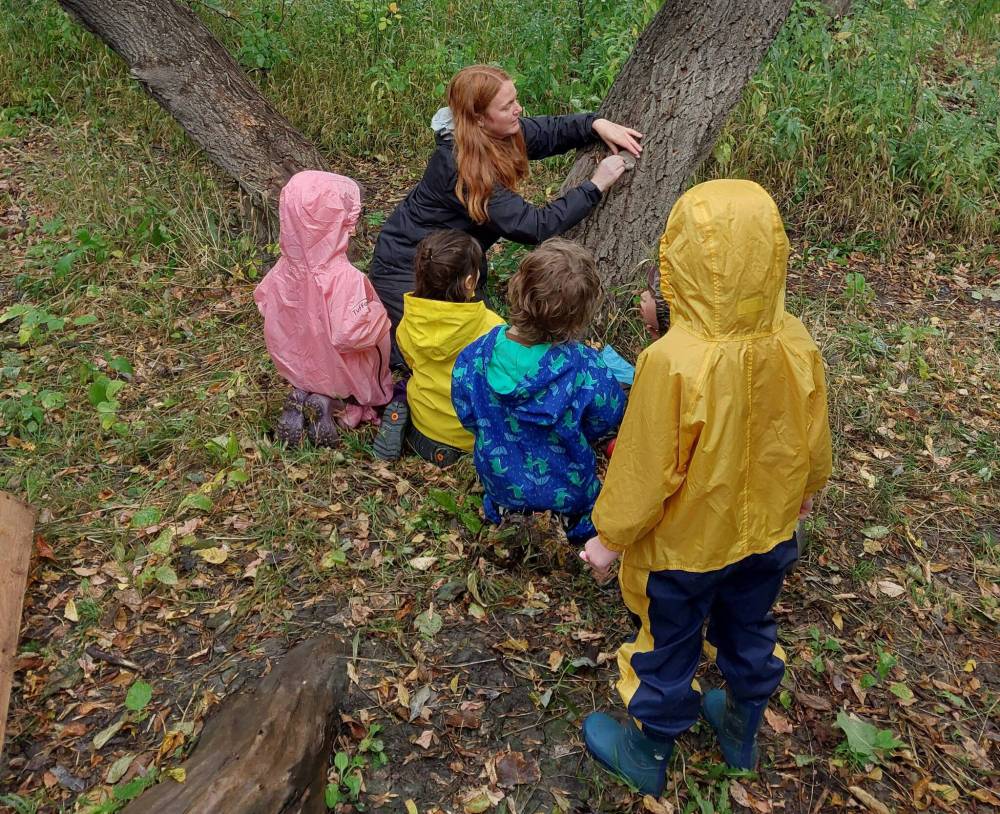From the ground up
Riverview Ashland’s new forest nursery program off and running
Advertisement
Hey there, time traveller!
This article was published 30/10/2024 (426 days ago), so information in it may no longer be current.
It’s hard, if not downright impossible, for kids to bounce off the walls if there are no walls.
That’s something Riverview Ashland Child Care Centre’s new, part-time forest nursery program takes to heart.
“We say that the land provides what we need and we can go to what we need,” said Esther McNairnay, forest nursery director, speaking to a reporter in the woods behind the Riverview Garden Society plots east of Churchill Drive.

Photo by Sheldon Birnie
Esther McNairnay, director of Riverview Ashland Child Care Centre’s new forest nursery program, which runs half-days Monday to Friday from September to July for children three to five years of age.
“We call this our classroom. We have boundaries marked with orange tape on either side. Beyond that, they explore where they like and it’s the same as any other nursery classroom, but outside.”
McNairnay, an early childhood educator II with 20 years experience, grew up in Riverview, with a family garden plot nearby. She is accompanied by Katie Daman, a child care assistant, each day with the children on their adventures.
“Where we play is what we always called the ‘monkey trails’ growing up,” McNairnay said, noting the space is found just off the riverbank between the Churchill Parkway and Don Gerrie Park. “It is a scruffy area. But small children don’t need a big woods. The riverbank is a good area, because it’s easy to navigate. They can’t go back into it and get lost; they figure out their map pretty quick.”
Forest nursery officially launched in September, with 12 half-day spots for children between three and five years of age, but McNairnay has used the woods around the neighbourhood for regular outings with Riverview Ashland Child Care children for years. The benefits of being outdoors and spending time in community were key to inspiring her to establish the forest nursery program under Riverview Ashland’s umbrella.
“Children who have trouble with sensory overload inside can really get down to their work out here,” she said. “Some kids find it easier to concentrate with their feet off the ground while they’re balancing. They can do that here. Some kids find when they’re excited their voices are loud. In the woods, that’s not as big a problem as it is within walls. You can’t have children bouncing off the walls if there are no walls.”
Having the Riverview Garden Society and Sustainable South Osborne Community Orchard nearby provides ample learning opportunities throughout the year.
“We have had lots of casual interactions with gardeners,” McNairnay said. “I have a family plot as well, so we visit it often. We’re also developing a relationship with the orchards, as well. Those apple trees, in my career, have been a great teacher of the seasons. It’s a bit of magic when you understand that the flower becomes the fruit. Being close to those things is such a gift.”
Because the natural classroom is on public land, interactions with neighbours are also taken in stride.
“It’s foundational in our program here, as it was when I worked in the traditional program, that children spend time in public places, so the fact that this is public land that we share with other neighbours, there can be evidence of other neighbours,” McNairnay said. “Sometimes that means that there’s evidence of someone else building a fort, or sometimes that means we’re cleaning up after a party, or sometimes we’re saying ‘Hi’ to someone walking their dog. To me, those are all important ways that children learn that they live in community.”
While the concept of nature-based learning goes back hundreds, if not thousands of years, the model is still relatively unique within Winnipeg.
“Forest schools, broadly, are a growing international movement. The way we think of them now kind of originated in the 1950s in Scandinavian countries and the U.K. It’s grown out from there,” said McNairnay, who completed a forest school practitioner course last year. “We also know, where we live in Treaty 1 territory, that learning on the land is the traditional way that kids learned. So we’re drawing on some very old ideas, while using a framework that’s a little newer.”

Supplied photo
Esther McNairnay, director of Riverview Ashland Child Care Centre’s new forest nursery program, is pictured with some children from the program in the woods between Churchill Drive and the Red River, where the program runs Monday to Friday.
A number of other forest- or nature-based childhood education options exist in Winnipeg — FortWhyte, Momenta, and Discovery Children’s Centre, for example — but Riverview Ashland is helping set a new precedent. With demand for child-care spaces in the city still high, having alternative options available remains important for caregivers across the city.
“There are teachers and ECEs who want to do it,” McNairnay said, noting she was one of 40 local forest school practitioners who completed training last year.
One challenge for programs such as these is that while 95 per cent of programming is delivered outdoors, the forest nursery must ensure it has adequate indoor space available at all times, should hazardous weather force students and staff indoors.
“We are fortunate that we can use (Riverview Ashland’s) school-age space as our indoor space if we need it,” McNairnay explained. “So the days school-age kids aren’t in school, in-service days and school breaks, our program doesn’t run.”
Come rain or shine, sleet or snow, McNairnay is hopeful that her program will not only thrive and grow, but that others with a similar ethos will sprout up in years to come.
“We find the play and camaraderie, the relationships, are so deep on the land,” she said. “Even if you’re uncomfortable outside in the winter, or you find you don’t know plants or whatever is holding you up, it’s a great place for kids to be and they will find things to do. It’s for everyone.”
Visit riverash.com/forestnursery for more information.

Sheldon Birnie
Community Journalist
Sheldon Birnie is a reporter/photographer for the Free Press Community Review. The author of Missing Like Teeth: An Oral History of Winnipeg Underground Rock (1990-2001), his writing has appeared in journals and online platforms across Canada, the U.S. and the U.K. A husband and father of two young children, Sheldon enjoys playing guitar and rec hockey when he can find the time. Email him at sheldon.birnie@freepress.mb.ca Call him at 204-697-7112
Our newsroom depends on a growing audience of readers to power our journalism. If you are not a paid reader, please consider becoming a subscriber.
Our newsroom depends on its audience of readers to power our journalism. Thank you for your support.




